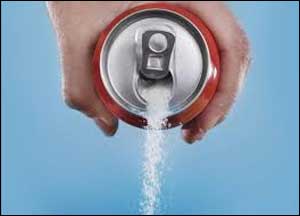- Home
- Editorial
- News
- Practice Guidelines
- Anesthesiology Guidelines
- Cancer Guidelines
- Cardiac Sciences Guidelines
- Critical Care Guidelines
- Dentistry Guidelines
- Dermatology Guidelines
- Diabetes and Endo Guidelines
- Diagnostics Guidelines
- ENT Guidelines
- Featured Practice Guidelines
- Gastroenterology Guidelines
- Geriatrics Guidelines
- Medicine Guidelines
- Nephrology Guidelines
- Neurosciences Guidelines
- Obs and Gynae Guidelines
- Ophthalmology Guidelines
- Orthopaedics Guidelines
- Paediatrics Guidelines
- Psychiatry Guidelines
- Pulmonology Guidelines
- Radiology Guidelines
- Surgery Guidelines
- Urology Guidelines
Diabetes Alert: Sugary drinks more harmful than sugary foods, says BMJ Meta-analysis

Publishing a Systematic review of 155 studies done in the past, Dr John Sievenpiper, at St. Michael’s Hospital in Toronto, Canada and colleagues have found that Sugary drinks are more harmful than sugary foods for causing diabetes.
The findings of the study suggest that fruit and other foods containing fructose seem to have no harmful effect on blood glucose levels, while sweetened drinks and some other foods that add excess “nutrient poor” energy to diets may have harmful effects. Therefore researchers feel that strategies to cut sweetened drink consumption could be useful.
“These findings might help guide recommendations on important food sources of fructose in the prevention and management of diabetes,” said Dr John Sievenpiper, the study’s lead author and a researcher in the Clinical Nutrition and Risk Factor Modification Centre of St. Michael’s Hospital in Toronto, Canada. “But the level of evidence is low and more high-quality studies are needed.”
Fructose occurs naturally in a range of foods, including whole fruits and vegetables, natural fruit juices and honey. It is also added to foods, such as soft drinks, breakfast cereals, baked goods, sweets, and desserts as ‘free sugars’.There is increasing evidence suggests that fructose could be particularly harmful to health.
In the study, the researchers analysed the results of 155 studies that assessed the effect of different food sources of fructose sugars on blood glucose levels in people with and without diabetes monitored for up to 12 weeks. The results were based on four study designs: substitution (comparing sugars with other carbohydrates), addition (energy from sugars added to diet), subtraction (energy from sugars removed from diet), or ad libitum. The outcomes were glycated haemoglobin or HbA1c, fasting glucose, and fasting insulin.
The studies were also assessed for bias and certainty of evidence and overall, no serious risk of bias was detected, but the certainty of evidence was low.
The results show that most foods containing fructose sugars do not have a harmful effect on blood glucose levels when these foods do not provide excess calories. However, a harmful effect was seen on fasting insulin in some studies.
Current dietary guidelines recommend reducing free sugars, especially fructose from sweetened beverages, but it is unclear whether this holds for all food sources of these sugars.
Analysis of specific foods suggest that fruit and fruit juice when these foods do not provide excess calories may have beneficial effects on blood glucose and insulin control, especially in people with diabetes, whereas several foods that add excess “nutrient poor” energy to the diet, especially sweetened drinks and fruit juice, seem to have harmful effects.
The low glycaemic index (GI) of fructose compared with other carbohydrates, and higher fibre content of fruit may help explain the improvements in blood glucose levels, by slowing down the release of sugars, say the researchers.
There were limitations to the study such as small sample sizes, short follow-up periods, and a limited variety of foods in some studies. The researcher concluded: “Until more information is available, public health professionals should be aware that harmful effects of fructose sugars on blood glucose seem to be mediated by energy and food source.”
You can read the study by clicking on the following link: http://www.bmj.com/content/

Disclaimer: This site is primarily intended for healthcare professionals. Any content/information on this website does not replace the advice of medical and/or health professionals and should not be construed as medical/diagnostic advice/endorsement or prescription. Use of this site is subject to our terms of use, privacy policy, advertisement policy. © 2020 Minerva Medical Treatment Pvt Ltd